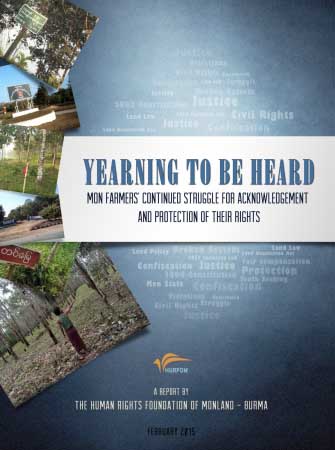Yearning to be Heard: Mon Farmers’ Continued Struggle for Acknowledgement and Protection of their Rights
By Human Rights Foundation of Monland • February 17, 2015 Land conflict is the most pressing issue facing Burma today, second only to armed conflict. Though Burma’s emerging democratic government has introduced land policy reform and has established land investigation commissions aimed to resolve land conflicts, civilian land acquisition by the Burmese military continues to take place, particularly in Burma’ minority ethnic areas.
Land conflict is the most pressing issue facing Burma today, second only to armed conflict. Though Burma’s emerging democratic government has introduced land policy reform and has established land investigation commissions aimed to resolve land conflicts, civilian land acquisition by the Burmese military continues to take place, particularly in Burma’ minority ethnic areas.
Victims of land confiscation under the previous military regime and today’s quasi-civilian government demand justice through reparations and the protection of their rights under the law, however, relevant authorities consistently neglect their calls for justice, leaving the majority of cases of land conflict throughout Burma’s ethnic states unresolved.
With particular attention to ongoing land conflict in Mon State, the Human Rights Foundation of Monland (HURFOM) has produced Yearning to be Heard: Mon Farmers’ Continued Struggle for Acknowledgement and Protection of their Rights, in efforts to advocate for ethnic Mon farmers’ land rights. Throughout this report, HURFOM contends that land conflicts in Mon State must be adequately and independently investigated in order to provide justice to victims of land rights abuse, in simultaneous effort in identifying the root cause of land conflict in Burma.
Yearning to be Heard highlights major cases of land confiscation that has taken place throughout Mon State; in Mon State’s Thanbyuzayat Township alone, the report identifies large-scale land confiscation perpetrated by Artillery Battalion No. 315 and the Military Advanced Training School No. 4, both based Thanbyuzayat Township. HURFOM interviewed 40 local plantation owners along the Yangon-Tavoy railway and highway in western Wae Kalee Village, from whom Artillery Battalion No. 315 seized 400 acres of rubber plantation, as well as over 30 plantation owners from Wae Kalee, Pa Nga and Phayalaysu Villages from whom the Military Advanced Training School No. 4 seized 800 acres of rubber plantation. Additionally, through information gathered from 76 interviews conducted with land confiscation victims in Thatkaw Village and Sakhan Gyi Village in Thanbyuzayat Township, HURFOM reports that Artillery Battalion No. 315 and the Military Advanced Training School No. 4 have confiscated over 1967.8 acres of civilian rubber plantation throughout these two villages.
Beyond reporting the vast numbers of civilian land unjustly confiscated by Burmese army battalions, Yearning to be Heardpresents an in-depth analysis of current domestic land law and policy, as well as proportional laws, which are of significant importance to solving Burma’s extensive land conflict.
HURFOM identifies the central causes of land conflict in Burma to be found in land policy that refuses to recognize communal and ancestral rights and fails to protect ethnic farmers’ rights, the absence of available legal avenues through which victims may take action against unjust confiscations which have been perpetrated by the military in accordance with antiquated laws, the Ministry of Agriculture and Irrigation’s monopoly over land management and allocation, the lack of any real authority granted to government-appointed land commissions and committees in decision-making and conflict resolution, and political parties’ reticence in supporting and promoting the resolution of Burma’s land conflict.
Through Yearning to be Heard,HURFOM documents evidence regarding abuses perpetrated against Mon landowners’ rights and their struggle for just resolution. HURFOM urges relevant government bodies to recognize ancestral land laws, immediately stop all acts of land confiscation, to protect landowners’ rights, and for the government to establish an independent judicial body which victims may access to obtain fair judgment on cases of land conflict.
Tags: Burma Army, Burma Government, Human Rights Foundation of Monland, Land Confiscation, Land Law, Mon, Mon StateThis post is in: Displacement, Ethnic Nationalities
Related Posts21st Century Panglong Conference Reaffirms Obstacles to Peace
Torture, extrajudicial killing, and use of civilians as human shields by Burma Army during new offensive against SSPP/SSA near Upper Yeywa dam site in Kyaukme
Time for a Fresh Start for Genuine Peace
An Open Letter to World Leaders on the Fourth Anniversary of The Resumption of War Calling Urgently for Humanitarian Aid for The Internally Displaced People of Northern Burma
The Burma Government Must Stop Condoning Sexual Violence in Conflict Areas









 All posts
All posts